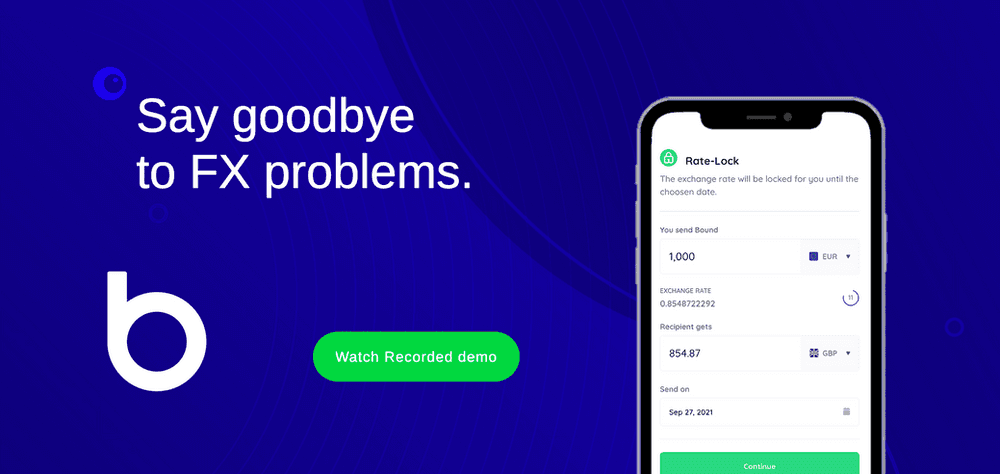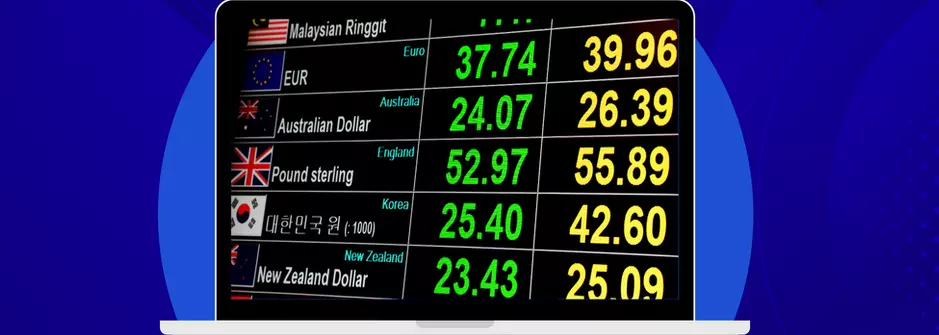What is the Real Exchange Rate?
By
bound-team
The real exchange rate is an exchange rate that is used to give a more accurate representation of the value of two currencies. Real exchange rates are calculated by adjusting the nominal exchange rate according to what it actually costs to buy things in two separate countries with different currencies.
What is the Nominal Exchange Rate?
Nominal exchange rates are the type of exchange rate that people are more familiar with. These simply express what one unit of one currency is worth in another currency.
For example, a nominal exchange rate between pound sterling (GBP) and euros (EUR) may be expressed as…
EUR/GBP = 0.85
At this exchange rate, 85 pence (or 0.85 GBP) is worth 1 euro.
The nominal exchange rate is very helpful because it tells us exactly how much of one currency can be exchanged for another at a particular point in time. However, they don’t really tell us what can actually be bought with each currency.
Real Exchange Rates
Real exchange rates can be used to compare the value of currencies in relation to each other over time by taking into account the effect that inflation has.
What they measure is the value of a country’s goods against those of another country and they are particularly useful when assessing the international trade and export competitiveness of a country.
Real exchange rates tell us what a currency is worth when its local buying power is taken into account. They are designed to be a more accurate reflection of the value of a currency. A simple way to look at how real exchange rates work is by comparing two items that would be expected to hold the same value in two countries. For example, Germany and the UK may both import the same coffee from the same part of the world, but that doesn’t necessarily mean that a cup of coffee costs the same in each country. The difference is particularly obvious if the price of the same type of coffee, sold by a particular chain that operates in both countries is different.
Coffee Price Differences
If, for example, a chain sold a regular-sized white americano in the UK for £2, you would expect the at the nominal exchange rate given earlier (EUR/GBP = 0.85) to cost €2.35 in Germany.
However, the actual price of this same coffee in Germany might be different. If this is the case, then the real exchange rate is said to be different from the nominal exchange rate.
Where the real exchange rate is different from the nominal exchange rate, it should be expected that the nominal exchange rate will adjust back to the appropriate level as the foreign exchange market comes into effect. Traders are able to take advantage of arbitrage opportunities, for example, by purchasing goods cheaply in one country and selling them in another where they are worth more.
It should be pointed out that while this coffee example may make things appear simple, the situation is actually quite complicated. The factors which affect the value of coffee, for example, vary from country to country. It is not necessarily the case that the exact same coffee should hold the same value in separate countries. Factors such as transportation, trade barriers, and local preferences all have an effect on the price.
The pressure for nominal exchange rates to adjust according to real exchange rates may also be complicated by the fact that governments often intervene to influence exchange rates.
Understanding Real Exchange Rates
A good way to understand real exchange rates is to look at them as representing the value of one country’s products in terms of another’s.
If we use the UK and the USA as examples, we can understand how each country’s products are valued against each other’s. The real exchange rate, effectively, tells us what products in the UK are worth in terms of products in the USA and vice versa. Rather than telling us how many US dollars (USD) you can buy for £1, the real exchange rate tells us what UK products you could swap for US products.
To help demonstrate things further, we can look at the value of Worcestershire Sauce in the UK and Jack Daniel’s whiskey in the US. The real exchange rate can be used to tell us how many bottles of Worcestershire Sauce it takes to buy a bottle of Jack Daniel’s.
US Dollars to Pound Sterling Real Exchange Rate
To calculate an effective exchange rate in this example you need three things. These are
A nominal exchange rate between GBP and USD
The price of a bottle of Worcestershire Sauce in the UK
The price of a bottle of Jack Daniel’s in the US
If (with some rounding up) we say that…
The nominal exchange rate is GBP/USD = 1.35
A bottle of Worcestershire Sauce costs 2 GBP
A bottle of Jack Daniel’s costs 30 USD
…we can see how real exchange rates work.
In this example, a bottle of Jack Daniel’s whiskey is worth 15 bottles of Worcestershire Sauce. This figure is meaningless, however, as an absolute number. It takes on a meaning, however, when the value of the goods changes.
Price Changes
If, for example, there is a general rise in prices in the US and, as a result of this, the cost of a bottle of Jack Daniel’s goes up to 40 USD (without the nominal exchange rate or prices changing in the UK) the effect of this will be obvious.
This price increase will mean that 1 bottle of Jack Daniel’s will now be worth 20 bottles of Worcestershire Sauce. Meanwhile, 1 GBP will still be worth 1.35 USD at the nominal exchange rate.
What has happened is that the real exchange rate has fallen, while the nominal exchange rate has remained stationary.
International Competitiveness
One key effect of a change to the real exchange rate is that it changes a country’s international trade competitiveness. When a country’s products become more expensive it will lose some of its international competitiveness.
If the real exchange rate for GBP/USD does decrease, buyers in the UK will be likely to make more domestic purchases and to increase imports from alternative countries to the US.
A buyer in the UK, for example, who is making the unusual choice of whether to buy locally produced Worcestershire Sauce or to import Jack Daniel’s will be more likely buy locally if the real exchange rate falls. While it may seem like a rash decision to buy 40 bottles of Worcestershire Sauce just because the value is better, the buyer will still be receiving better value.
How Do You Actually Calculate the Real Exchange Rate?
The real exchange rate is calculated using the following formula...

A change to the real exchange rate can be brought about by a change to either the nominal exchange rate, foreign price levels, or local price levels.
What happens, in reality, is that these three factors are in a constant state of flux. It is how they change in relation to each other that matters. If for, example, there is a change to foreign price levels, but there is also a corresponding change to local price levels at the same time then the real exchange rate may not be affected.
Measuring the Value of a Currency
The real exchange rate is particularly useful when trying to accurately measure the actual value of two currencies relative to each other.
However, what is often used when trying to make a general assessment of the value of a particular currency is the real effective exchange rate. Effective exchange rates, rather than just comparing two currencies to each other, compare a particular currency to a selection of other currencies.
By using a number of different currencies, usually, those of a country’s major trading partners, a more accurate overall representation of the value of a currency can be achieved.
Nominal and Real Effective Exchange Rates
Just like with real exchange rates between two currencies (bilateral real exchange rates), effective exchange rates can be either nominal or real.
Again, nominal effective exchange rates just indicate what a particular currency is worth directly for exchange against the currencies of its major trading partners. Real effective exchange rates take into account price disparities as well to give a more accurate figure based on the price disparities between a country and its major trading partners.





